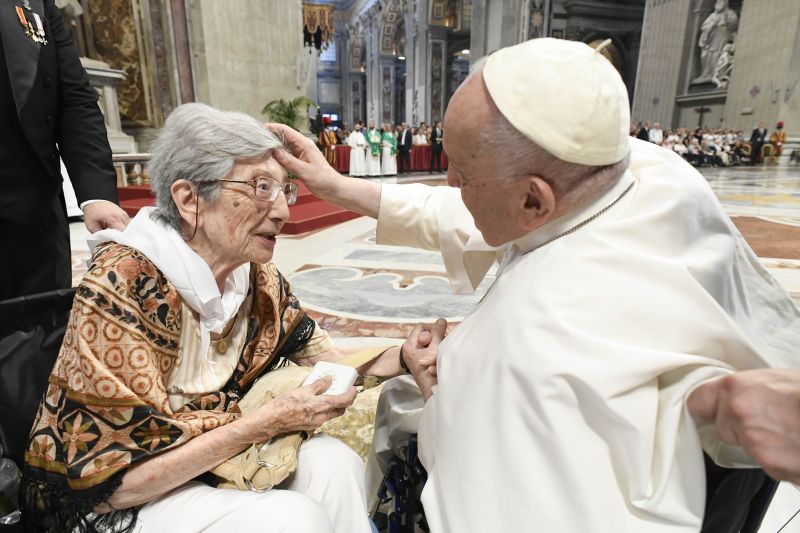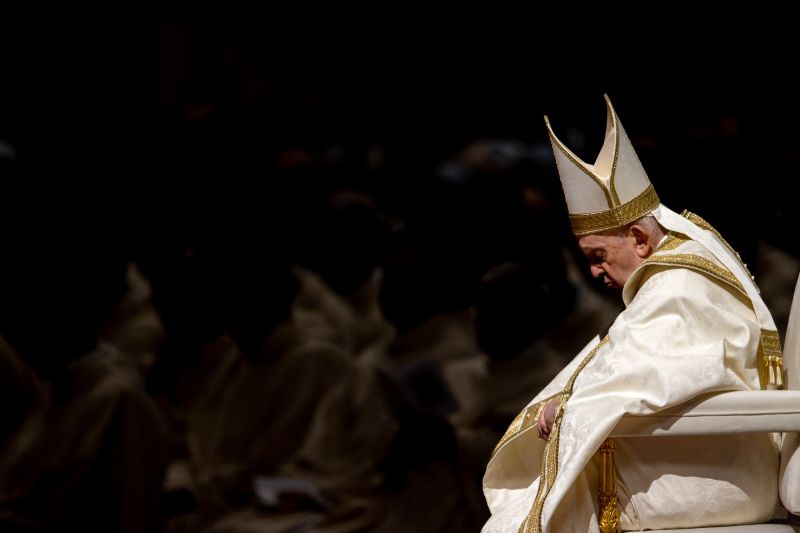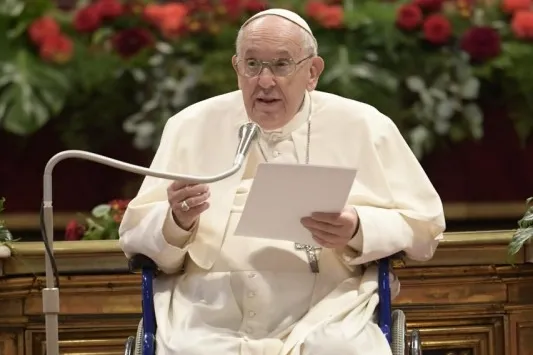
Pope Francis celebrates World Day for Grandparents and the Elderly
 Pope Francis blesses a woman in St. Peter’s Basilica, where he presided over a special papal Mass on July 23, 2023, marking the third annual World Day for Grandparents and the Elderly. / Vatican Media
Pope Francis blesses a woman in St. Peter’s Basilica, where he presided over a special papal Mass on July 23, 2023, marking the third annual World Day for Grandparents and the Elderly. / Vatican Media
Rome Newsroom, Jul 23, 2023 / 07:25 am (CNA).
Calling for “a new bond between the young and old,” Pope Francis marked the third annual World Day for Grandparents and the Elderly with an intergenerational Mass Sunday in St. Peter’s Basilica.
Old age is a “blessed time,” the pope affirmed in his homily, “for it is the season to be reconciled, a time for looking tenderly at the light that has shone despite the shadows, confident in the hope that the good wheat sown by God will prevail over the weeds with which the devil has wanted to plague our hearts.”
“How much we need a new bond between young and old,” Pope Francis said, “so that the sap of those who have a long experience of life behind them will nourish the shoots of hope of those who are growing. In this fruitful exchange we can learn the beauty of life, build a fraternal society, and in the Church, be enabled to encounter one another and dialogue between tradition and the newness of the Spirit.”
Sunday marked the first time Pope Francis presided over the special papal Mass since initiating the World Day of Grandparents and the Elderly in 2021. The celebration is now held on the fourth Sunday of July — the Sunday closest to the July 26 feast of Joachim and Anne, the grandparents of Jesus.
Joining some 6,000 grandparents and older people at the liturgy were young people bound for World Youth Day in Lisbon, Portugal, which begins Aug. 1. Before the final blessing of the Mass, five youths and five elderly people, representing the five continents, processed to the front of the basilica. The elderly people then placed pilgrim’s crosses around the necks of the young people.
Growing together
In his homily, Pope Francis reflected on three parables of Jesus in Sunday’s Gospel from Matthew, focusing on the theme of “growing together.”
“Jesus uses parables to teach us about the kingdom of God. He recounts simple stories that touch the hearts of his listeners,” the pope observed.
“Such language, full of imagery, resembles the language that grandparents often use with their grandchildren, perhaps while holding them on their laps. In this way they pass on a wisdom important for life,” he said.
In the first parable, the farmer commands that the wheat and the weeds be allowed to grow together until harvest time.
“This image,” the Holy Father said, “helps us to see things realistically: In human history, as in each of our lives, there is a mixture of light and shadows, love and selfishness. Good and evil are even intertwined to the point of seeming inseparable.”
Pope Francis said this is a “realistic approach” that helps us to look at history avoiding both “sterile optimism” and “poisonous pessimism.”
“Christians, motivated by the hope of God, are not pessimists; nor do they naïvely live in a fairy tale, pretending not to see evil and saying that ‘all is well.’ No, Christians are realists: they know that there are wheat and weeds in the world,” he said.
Christians recognize this interplay not just in the world at large, but also in their own lives, he continued, realizing that “evil comes also from within us.”
The parable poses the question of what should be done with this situation, and the pope noted how the servants want to pull up the weeds.
“This attitude comes from good intentions, but is impulsive and aggressive,” Pope Francis warned.
“They delude themselves into thinking that they can uproot evil by their own efforts in order to save what is pure,” he continued. “Indeed, we frequently see the temptation of seeking to bring about a ‘pure society,’ a ‘pure Church,’ whereas in working to reach this purity, we risk being impatient, intransigent, even violent toward those who have fallen into error. In this way, together with the weeds we pull up the good wheat and block people from moving forward, from growing and changing.”
Instead, Jesus says the wheat and weeds have to grow together, the Holy Father emphasized.
“How beautiful is this vision of God, his way of teaching us about mercy,” the pope said. “This invites us to be patient with others, to be patient with others and — in our families, in the Church, and in society — to welcome weakness, delay, and limitations, not in order to let ourselves grow accustomed to them or excuse them, but to learn to act with respect, caring for the good wheat gently and patiently.”
In any case, it is God’s work, not ours, to purify the heart and claim the definitive victory over evil, the pope said.
He then noted how this attitude helps us to look back over our lives, especially when we’ve lived longer.
The elderly, he noted, look back over their lives and see “so many beautiful things” but also the “defeats and mistakes.”
“Yet today the Lord offers us a gentle word that invites us to accept the mystery of life with serenity and patience, to leave judgment to him, and not to live regretful and remorseful lives,” he said. “It is as if Jesus wanted to say to us: ‘Look at the good wheat that has sprouted along the path of your life and let it keep growing, entrusting everything to me, for I always forgive: in the end, the good will be stronger than the evil.’”
Pope Francis considered the second and third parables, about the mustard tree and the yeast, as images to encourage the elderly and the young to dwell together.
Scripture calls us to be vigilant so we don’t marginalize the elderly, the pope said, “so that our crowded cities do not become ‘centers of loneliness’; that politics, called to provide for the needs of the most fragile, never forgets the elderly nor allows the market to banish them as ‘unprofitable waste.’
“May we not chase after the utopias of efficiency and performance at full speed, lest we become incapable of slowing down to accompany those who struggle to keep up,” the pope urged. “Please, let us mingle and grow together.”
Three fields
Following the Mass, Pope Francis underscored this theme when he prayed the traditional midday Angelus from a window overlooking St. Peter’s Square, flanked by a grandmother and grandson.
Reiterating the themes from his homily, the pope warned against judging our neighbors or trying to create a perfect world by uprooting the weeds. However, he noted, there is a place where we are free to work, and that is in our hearts.
There, we must have “constant care of the delicate shoots of goodness” as well as dedicate ourselves to “identify and uproot the weeds.”
“There is a good method for this,” he said: “It is the examination of conscience, which serves precisely to verify, in the light of God, what is happening in the field of the heart.”
In summary, he posed three questions for the faithful to ponder.
“Thinking of the field of the world: Do I know how to resist the temptation to ‘bundle all the grass together,’ to sweep others aside with my judgments?” he asked. “Then, thinking of the field of the heart: Am I honest in seeking out the bad weeds in myself, and decisive in throwing them into the fire of God’s mercy?
“And, thinking of the neighbor’s field: Do I have the wisdom to see what is good without being discouraged by the limitations and limits of others?”
In his remarks after the Angelus reflection, Pope Francis mentioned the exceptionally severe monsoon season in South Korea that brought flash flooding last week, killing at least 40 people in the North Gyeongsang province.
He also lamented the ongoing suffering of people trying to migrate, especially through deserts. Referring again to the Mediterranean as a “cemetery,” he prayed that our hearts might be illuminated so that we show more solidarity. This month, migrants from sub-Saharan Africa were chased out of Tunisia to deserts along the border with Libya and Algeria. While several hundred have since been rescued, pockets of people are still stranded.
As he does in every public address, the pope reiterated his appeal for prayer for Ukraine. He noted that last night’s strike in Odessa badly damaged the historic Transfiguration Cathedral, an Orthodox cathedral in the city.
He closed with his traditional request that the faithful pray for him, but added an appeal to pray for all grandparents.



